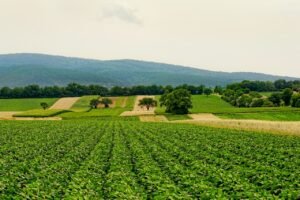Imagine a bustling cityscape, filled with skyscrapers and bustling streets. Now picture amidst all of that, patches of greenery sprouting up in unexpected places. This is the new phenomenon sweeping across Indonesia – urban farming. As the country grapples with rapid urbanization and the depletion of agricultural land, more and more city-dwellers are turning to the practice of growing their own food in urban areas. From rooftop gardens to vertical farms, the rise of urban farming in Indonesia is not only addressing food security concerns, but also paving the way for a greener and more sustainable future.

Heading 1
The Rise of Urban Farming in Indonesia
Urban farming has become a growing trend in Indonesia, and it is no wonder why. With the country’s rapid urbanization and the increasing need for sustainable food production, many people are turning to the concept of growing their own food in urban areas. Through innovative techniques and a passion for agriculture, urban farming in Indonesia is making an impact on the local communities and the environment.
Heading 2
Benefits of Urban Farming
Urban farming offers various benefits that contribute to the growing popularity of this practice. Firstly, it provides a solution to the limited availability of arable land in urban areas. By utilizing vertical gardens, rooftop gardens, and hydroponic systems, individuals can grow crops in spaces that were previously underutilized. This not only maximizes the use of available land but also minimizes the reliance on imported agricultural products.
Secondly, urban farming promotes food security. With the ability to grow fresh produce in the heart of the city, individuals have direct access to nutritious fruits, vegetables, and herbs. This reduces the reliance on long-distance transportation and ensures that communities have a reliable and sustainable source of food.
Finally, urban farming contributes to environmental sustainability. By growing food locally, there is a significant reduction in carbon emissions from transportation. Additionally, urban farms often incorporate sustainable farming practices, such as composting and the use of organic fertilizers, which minimize harm to the environment. These practices also promote biodiversity within the urban landscape.

Heading 3
Types of Urban Farming in Indonesia
Indonesia has embraced various types of urban farming, each offering unique approaches to growing food in urban areas.
One form of urban farming is rooftop gardens. By utilizing the rooftops of buildings, individuals can transform these spaces into flourishing gardens. Rooftop gardens are ideal for growing a variety of vegetables and herbs, making them a popular choice for urban dwellers who want fresh produce at their fingertips.
Vertical farming is another innovative technique of urban farming. Through the use of vertical structures, such as stacked planters or hydroponic towers, individuals can grow crops in a limited amount of space vertically. This method is particularly useful in densely populated areas where horizontal space is scarce.
Community gardens are also prevalent in Indonesia. These gardens bring people together, allowing them to collectively grow and harvest crops. Community gardens not only provide fresh produce to participants but also strengthen social bonds and promote a sense of community.
Heading 4
Challenges and Solutions
While urban farming in Indonesia has gained popularity, it is not without its challenges. One of the main obstacles is the lack of access to affordable resources and equipment. Many urban farmers face difficulties in acquiring suitable land or obtaining necessary tools for their gardens. To address this issue, various non-profit organizations and government initiatives have been established to provide support and resources to urban farmers. These programs offer training, affordable land, and access to affordable equipment, making urban farming more accessible to all.
Another challenge is the limited knowledge and awareness about urban farming. Many individuals are unfamiliar with the techniques and benefits of growing food in urban areas. To combat this, educational programs and workshops are being conducted to raise awareness and provide essential knowledge about urban farming. By spreading the word and sharing success stories, more people can be inspired to embark on their own urban farming journey.

Heading 5
Success Stories of Urban Farming in Indonesia
Despite the challenges, there have been numerous success stories in urban farming throughout Indonesia. For example, in the city of Bandung, a group of young entrepreneurs transformed an unused parking lot into a thriving urban farm. By utilizing hydroponic systems and vertical gardens, they are able to produce a wide variety of vegetables and herbs, supplying the local community with fresh, locally-grown produce.
In Jakarta, a community garden project has brought together residents from different neighborhoods. Through their collective efforts, they have transformed vacant lots and unused spaces into lush gardens. These gardens not only provide fresh produce but also serve as a gathering place for the community, fostering social cohesion and a sense of belonging.
Heading 6
The Future of Urban Farming in Indonesia
The future of urban farming in Indonesia looks promising. As more individuals and communities recognize the importance of local food production and sustainability, urban farming is expected to continue to grow in popularity. Government support, increased awareness, and improved access to resources will play crucial roles in fostering the expansion of urban farming throughout the country.
In conclusion, urban farming in Indonesia has emerged as a practical and sustainable solution to the challenges posed by rapid urbanization. By utilizing innovative techniques and embracing the concept of local food production, urban farming offers numerous benefits, including increased food security, environmental sustainability, and community engagement. With the rising popularity and success stories of urban farming, it is clear that this practice will continue to shape the future of agriculture in Indonesia. So, why not join the movement and start your own urban farm? With a little effort and a lot of passion, you can make a positive impact on your community and the environment while enjoying the freshest produce just a few steps away from your doorstep. Happy farming!







